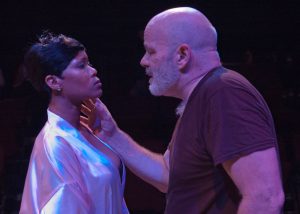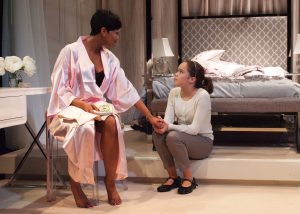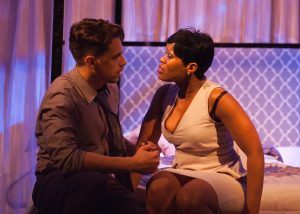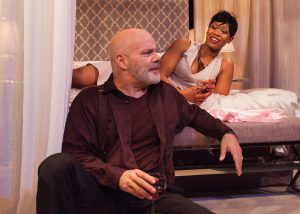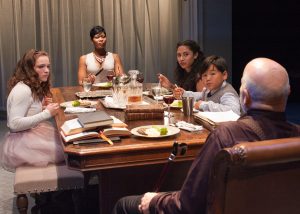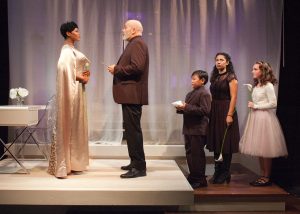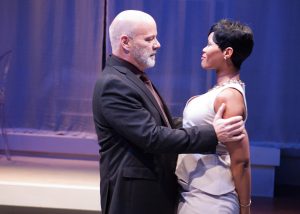THREE CATHERINES, YOU’RE OUT
If you were one of his sextet of spouses, outlasting Henry VIII wasn’t just a feat of survival’”it became a political statement. The last and possibly least known of this Bluebeard’s six wives, Catherine Parr was the most learned and devout consort. A shrewd negotiator in domestic and foreign affairs, she was ahead of her time, which makes her ripe for ours.
No plaster saint of wifely virtue, like at least two predecessors (both beheaded), she had an illicit affair, before and after Henry. We witness her long liaison with feckless Thomas Seymour, who she would secretly marry after the wife-killer’s death in 1547. (Parr, as Henry called her, escaped the block but Thomas would be executed in 1549 for treason by Henry’s short-lived successor Edward VI.) As much as Anne Boleyn or the other Catherines (of Aragon and Howard), she deserves her play too.
The unsung and proto-feminist heroine of Kate Hennig’s updating The Last Wife, Catherine is, as “Shakespeare’s sister” was for Virginia Woolf, an exemplum of the squandered worth of a capable woman. Not that her reputation needs rehabilitation (like Catherine Howard or Anne Boleyn). Catherine just needs recognition: TimeLine Theatre Company’s U.S. premiere of last summer’s Stratford Festival hit successfully shows us what might have been as well as what was. If Henry’s all-consuming goal is to see his son on the throne, Catherine’s is to reconcile her dreams with a regal marriage that in her heart should always have been “something other than this.”
Displaying the intimate revisionism of the royal soap opera Lion in Winter (a left-handed tribute to Eleanor of Aquitaine, another underappreciated medieval matron), Nick Bowling’s spirited staging spotlights a lady so accomplished she had to be taken for a witch’”and a wife who will neither be a mistress nor a master.
AnJi White plays widow Catherine as a reluctant helpmate to a former playboy. Rising to many unscripted occasions, this survivor was a healer who treated the ten-year wound of Henry’s ulcerous leg. A rape victim who refuses to succumb to insecurity, she becomes a surrogate mom who protects and instructs Mary (Paola Sanchez Abreu), Edward (Matthew Abraham alternating with Chinguun Sergelen) and Elizabeth (Caroline Heffernan alternating with Peyton Shaffer), Henry’s children from three previous marriages. As the play’s last line declares, she made history: It didn’t make her.
Like her motto “To be useful in all I do,” this best of Henry’s three Catherines fosters a future that extended to at least 1603: She persuades the girls to sign oaths of allegiance to dad, proclaiming them as princesses and restoring their legitimacy and right to the throne. As Regent (and later Protector), she even established five laws and strategically aided Henry (a splenetic Steve Pickering) in his last military expedition. When Henry’s reactionary Privy Council wanted this enlightened lady put to death, Henry signed the warrant but, impressed by her arguments and having witnessed her usefulness, refused to order the execution.
Unintentionally, in her four years on the throne Catherine inspired the prototype of an effective queen: It would later be copied, well or badly, by women named Mary, Elizabeth, Anne, and Victoria. And all this time she remained true to Thomas (a supple Nate Santana), an opportunist and belittler like Henry who would give her the daughter whose birth would kill Catherine a year after Henry’s demise.
The Last Wife could be dismissed as one more unedifying example of what happens when bad mates happen to smart women. What fascinates across these 150 minutes is the complex love/hate relationship between Pickering’s volatile, paranoid Tudor blusterer and White’s calculatedly invisible manipulator and arch tactician. White’s supple, multi-lingual Catherine can range from contentment over the quiet domesticity of embroidery (which Henry practiced too) to the pleasures of introducing future monarchs to Aristotle to the risk and danger of adultery itself.
Ending Catherine’s centuries-long silence over her superiority to the men in her world, Hennig provides a fine actress with a role well worth the wait. Pickering and White may not connect emotionally on stage, but why must art have to improve on life?
The bigger problem is that a modern-dress staging (with American accents, no less) distances us from how remarkable Parr actually was in 16th century England. But, no anachronism here, this Catherine’s feminist counsel to the girls she learned to love (a sort of School for Queens), however wary or conditional, doesn’t feel like a blast from the future. A greater challenge for the play and production, defeated by a false urge for relevance, would be to sell Catherine’s credo while keeping it in the past.
photos by Lara Goetsch
The Last Wife
TimeLine Theatre
615 W. Wellington Ave.
ends on December 18, 2016
for tickets, call 773.281.8463 or visit Timeline
for more shows, visit Theatre in Chicago

